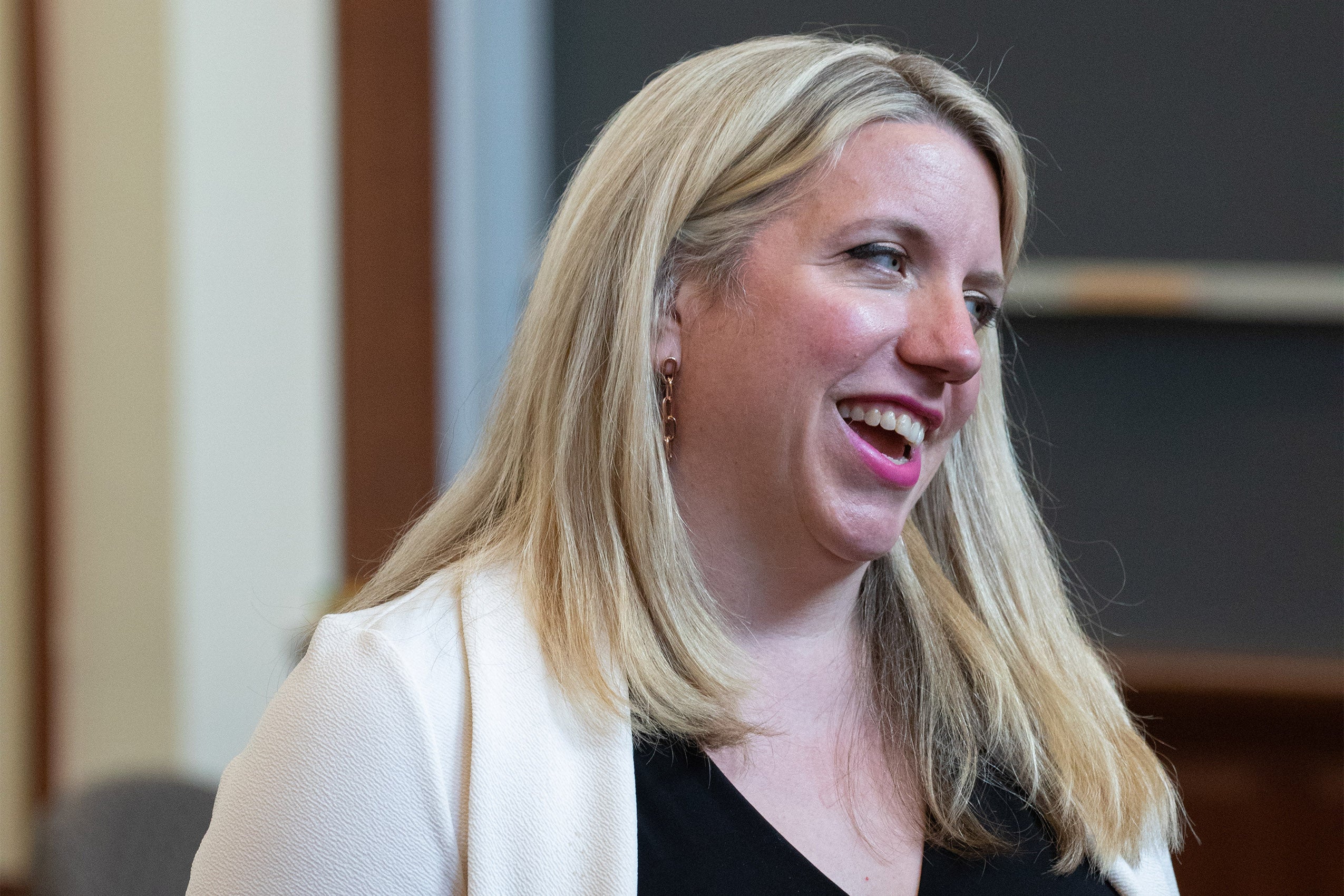It’s not often that a favorite Harvard professor will remind you never to wash your vegetables with soap. Or to order scallops at a VIP dinner whenever possible. Or to make sure that all your public addresses are under a half-hour long.
Those were a few of the insights that Harvard Law School Professor Maureen (Molly) Brady offered in a Last Lecture to graduating Harvard Law students that she built around the theme, “Advice I Did Not Take.” Brady, who specializes in property law, recently gave birth to a son and took time from her maternity leave to deliver the second of this year’s sendoff addresses to the graduating class.
While her talk displayed some impeccable comic timing — and did indeed wrap up within 30 minutes — each of her lighthearted premises ultimately led to a useful bit of real-life wisdom. In each case, Brady stressed the importance of knowing when to take advice, and when to take it with a grain of salt.
She learned the scallop lesson the hard way, she said: Instead of the more benign dish, she made the mistake of ordering an artichoke at an important job interview. “Fun fact about the artichoke: The outer leaves are completely inedible. As I had never had an artichoke before, I did not know this … I realized with horror that I had an enormous clump of artichoke leaves in my mouth, and no graceful way to get rid of them.”
So, Brady took a risk and got embarrassed — something she told the graduates they should also be willing to do. “I hope you embarrass yourselves in trying new things, in going out for a position that’s a reach, and in slightly misremembering a case from law school in a conversation. And I hope that one day when you go for a job interview, you mainline a dozen oysters in a way that shocks onlookers.”
As for the vegetables, she started washing them against her parents’ advice when a YouTube video that she saw during the COVID pandemic induced her to do so. This, Brady said, was typical of peoples’ natural tendency to seek information during moments of crisis — something she experienced on a more serious level when she lived in Charlottesville during the white power rallies.
“Brainiacs like yourselves may be especially likely to seek information and, more importantly, many of you will be people that others turn to when they are afraid,” she told the students. “People are going to be inclined to believe what you have to say, so take your responsibility to educate and not to mislead very seriously.”
Brady also recalled that many fellow professors advised her to wear a dark suit while teaching, because a younger female professor might need to work harder to get respect from the students. Instead of taking this advice, Brady said she chose to cultivate her own, quirkier style.
In the long term, it’s hard to disguise who and what you are. There is unexpected value in authenticity — for you personally, and value in becoming an example of a different way.
“I started dressing for the job I actually wanted, which was to be like Miss Frizzle from [the 1990s TV series] The Magic School Bus, but for property law,” she said. “This felt weird at first, but it would have been much harder to fit the image of what a professor was supposed to look like.” The lesson for students was that conformity isn’t always a virtue: “In the long term, it’s hard to disguise who and what you are. There is unexpected value in authenticity — for you personally, and value in becoming an example of a different way. So, I’ve been very happy to be the lady in the weird fox shirt.”
Other points were less humorous. Brady admitted that she’s still working on following her own advice about prioritizing family and friends — something she finds especially important now that she’s a parent.
“I’d like to tell you that I’ve successfully managed work-life balance and ruthless ambition, but I can’t always say that I have,” she said. “I’ve missed baby showers. I’ve spent a beautiful weekend of weather binge-writing to meet a deadline. It’s very tempting to continuously push how much you can do with your degree. But do not forget that there’s always a cost.”
Brady said she was glad she ignored advice to never use Twitter, which she found useful both for networking with peers and keeping up with students. “Waste your time on your own terms. It might be the dumpster fire you need at the end of your workday.”
And she said that a good lawyer should know when to ignore the old truism that time is money. “Not every worthwhile way that you spend your time will earn you accolades or money. There are ways you can use your skills to educate, mentor, protect, or nurture others that will never translate neatly to money, but in hindsight will seem like the most obvious and the best choices.”
Finally, she suggested students master the knack of not talking endlessly and listening to others instead. “I haven’t exactly been hitting the cocktail party circuit since March of 2020,” she said. “But the various Zoom breakout rooms I’ve attended since then have taught me that I tend to enjoy things more when I get to listen and learn from others. I feel pretty terrible if I get to the end of a class, or an office hour with you, and find I’ve consumed all of the airtime.”
Brady said she expected the graduates to leave Harvard Law School with a working compass for advice. “I’m confident that in both following and in rejecting the common wisdom, you’re going to make us proud.”
